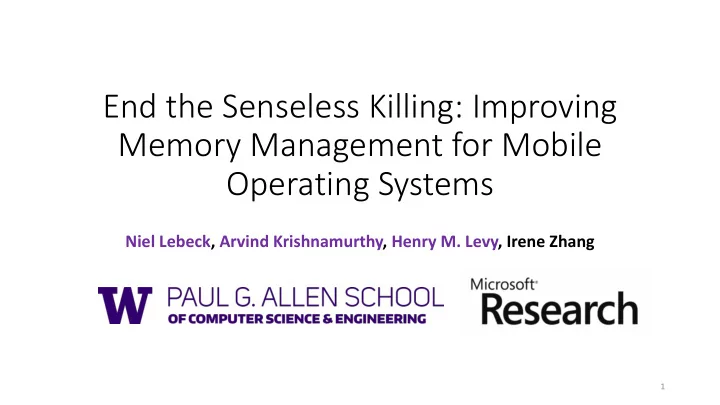
Memory Management for Mobile Operating Systems Niel Lebeck, Arvind - PowerPoint PPT Presentation
End the Senseless Killing: Improving Memory Management for Mobile Operating Systems Niel Lebeck, Arvind Krishnamurthy, Henry M. Levy, Irene Zhang 1 Disclaimers I currently work at Google (not on Android) This work is not connected with
End the Senseless Killing: Improving Memory Management for Mobile Operating Systems Niel Lebeck, Arvind Krishnamurthy, Henry M. Levy, Irene Zhang 1
Disclaimers • I currently work at Google (not on Android) • This work is not connected with Google • Research was done while I was a graduate student at UW • All data is from our experiments or open-source resources • All opinions are our own 2
This talk • Motivation • Key insight and Marvin • Marvin’s mechanisms • Marvin’s features • Implementation and evaluation 3
Today’s mobile memory management is bad for users and applications • Each app gets a fixed maximum memory budget • Mobile OS kills apps when the device runs out of memory • Even if apps are not actively using their memory • Restarting apps takes time Working set • Developers must optimize app memory usage App 4
Traditional swapping is not a solution • Not suited to managed languages (e.g., Java) • Garbage collection causes swapping, confuses working set estimation (WSE) • Page-granularity swapping and WSE do not fit variable-sized objects • Not suited to latency-sensitive touch devices • On-demand swapping causes stuttering and delays 5
This talk • Motivation • Key insight and Marvin • Marvin’s mechanisms • Marvin’s features • Implementation and evaluation 6
Key insight • We can co-design the runtime and OS to improve mobile memory management • Possible because modern mobile platforms require all apps to use the same runtime 7
Marvin • Android memory manager co- designed with Android’s Java runtime • Reintroduces swapping to the mobile environment 8
Marvin • Marvin has three main features: • Ahead-of-time swap • Object-level working set estimation • Bookmarking garbage collector [Hertz 05] 9
This talk • Motivation • Key insight and Marvin • Marvin’s mechanisms • Stubs indirection layer between objects • Reclamation table allows the runtime and OS to coordinate • Object access interposition lets the runtime transparently take action • Marvin’s features • Implementation and evaluation 10
Stubs • We need an indirection layer between objects referencing each other • Catch accesses to swapped-out objects • Stubs provide that indirection layer • Small pseudo- objects that sit in the Java heap and point to the “real” object • Store copies of the real object’s references Java Heap Reclaimable Object Space obj B obj A obj C stub 11
Reclamation table • We need a way for the runtime and OS to coordinate • Tell OS which objects can be reclaimed • Prevent OS from reclaiming an object being used by the runtime • A shared-memory reclamation table allows that coordination • Stores an object’s location and size, and has metadata bits for locking Reclamation Table Java Heap Reclaimable Object Space address size res app kernel lock lock obj B 0xc00d00a0 512 1 0 0 obj A obj C 0xc00e1410 128 1 2 0 stub 0xc0002320 8192 1 0 0 12
Object access interposition • The runtime needs a way to transparently act when app code accesses objects • Restoring swapped-out objects • Update working set metadata • Object access interposition is a set of paired interpreter and compiler modifications implementing those actions • Interpreter directly acts when performing object accesses • Compiler generates additional ARM64 instructions around object accesses 13
This talk • Motivation • Key insight and Marvin • Marvin’s mechanisms • Marvin’s features • Ahead-of-time swap • Object-level working set estimation • Bookmarking garbage collector • Implementation and evaluation 14
Swap File Ahead-of-time swap foo • Runtime uses object access interposition to set dirty bit in object header • Runtime clears dirty bit after saving an object Reclaimable Object • Kernel checks dirty bit before Space reclaiming an object 0 1 Interpreter foo foo.setX( 42 ); Compiled ARM64 code 15
Swap File Ahead-of-time swap foo • Runtime uses object access interposition to set dirty bit in object header • Runtime clears dirty bit after saving an object Reclaimable Object • Kernel checks dirty bit before Space reclaiming an object 0 1 0 foo 16
This talk • Motivation • Key insight and Marvin • Marvin’s mechanisms • Marvin’s features • Ahead-of-time swap • Object-level working set estimation • Bookmarking garbage collector • Implementation and evaluation 17
Object-level working set estimation • Runtime uses object access interposition to set access bits • Runtime scans access bits and updates longer-term WSE metadata Read bit Write bit Read shift register Write shift register int x = foo.getX(); 0 | 0 | 1100 | 0000 0 | 0 | 1001 | 0000 1 | 0 | 1100 | 0000 Garbage foo Compiled collector Interpreter ARM64 heap-walk code 18
This talk • Motivation • Key insight and Marvin • Marvin’s mechanisms • Marvin’s features • Ahead-of-time swap • Object-level working set estimation • Bookmarking garbage collector • Implementation and evaluation 19
Bookmarking garbage collector • Runtime uses object access interposition to maintain stub references • GC detects stubs and reads references without touching underlying objects Reclamation Reclaimable Object Java Heap foo.setMember(bar) Table Space stub(foo) foo Compiled member = null member = 0x7000001a member = null member = 0x7000001a ARM64 Interpreter code bar 20
Bookmarking garbage collector • Runtime uses object access interposition to maintain stub references • GC detects stubs and reads references without touching underlying objects Reclamation Reclaimable Object Java Heap Table Space stub(foo) foo Garbage member = null member = 0x7000001a collector member = null member = 0x7000001a bar 21
This talk • Motivation • Key insight and Marvin • Marvin’s mechanisms • Marvin’s features • Ahead-of-time swap • Object-level working set estimation • Bookmarking garbage collector • Implementation and evaluation 22
Marvin implementation • We modified the Android Runtime (ART) to implement Marvin • Default policy keeps the foreground app’s objects in -memory • For experiments, we trigger reclamation in the runtime 23
Evaluation • Experimental setup: • Pixel XL phones • Android 7.1.1 (or our modified build) • Questions: • Does Marvin let users run more apps? • Does ahead-of-time swap work? • What is Marvin’s overhead? 24
Does Marvin let users run more apps? • We periodically started instances of a benchmark app • Initializes a 220MB heap with a mix of 4KB and 1MB arrays • Deletes and re-allocates 20MB of those arrays every 5 seconds • We measured the number of active apps : apps that are alive and making progress on their workloads 25
Does Marvin let users run more apps? • Marvin can run over 2x as many apps as stock Android • On Android w/ Linux swap, a little allocation makes apps unusable Android w/ Linux swap consistently crashed early 26
Does ahead-of-time swap work? • Marvin reclaims memory much faster than Android w/ Linux swap Marvin Android ≈100ms ≈8 seconds 27
What is Marvin’s overhead? • When objects are memory- resident, execution overheard depends on proportion of object accesses • Overhead is reasonable (15%) on PCMark benchmark 28
Related work Similarities with Marvin Acclaim [Liang 20] SmartSwap [Zhu 17] A2S [Kim 17] MARS [Guo 15] Policies distinguish between foreground and background apps 29
Related work Similarities with Marvin Acclaim [Liang 20] SmartSwap [Zhu 17] A2S [Kim 17] MARS [Guo 15] Addresses incompatibility of garbage collection and kernel-level swap 30
Related work Differences from Marvin Acclaim [Liang 20] SmartSwap [Zhu 17] A2S [Kim 17] MARS [Guo 15] Perform swapping at the kernel level rather than the runtime level 31
Conclusion • Problem: Today’s mobile memory management is inadequate • Insight: We can co-design the runtime and OS to improve memory management • Solution: Marvin improves mobile memory management with three co-design features • Ahead-of-time swap • Object-level working set estimation • Bookmarking garbage collection 32
Thanks! • Marvin source code is available on GitHub: https://github.com/UWSysLab • Contact: nl35@cs.washington.edu 33
Recommend
More recommend
Explore More Topics
Stay informed with curated content and fresh updates.
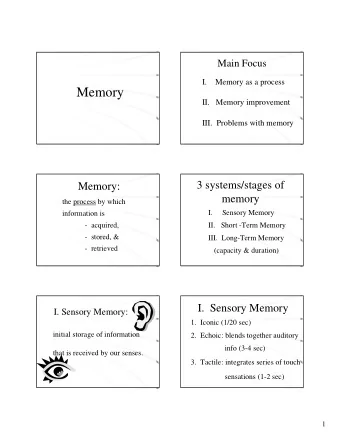


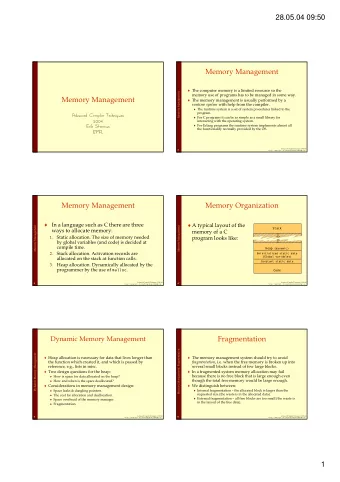



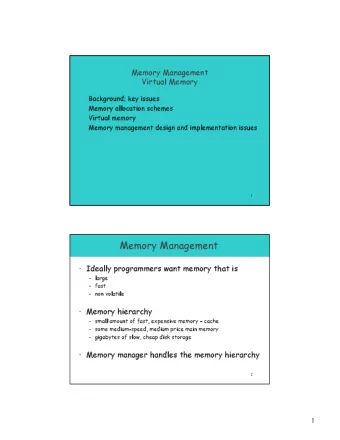
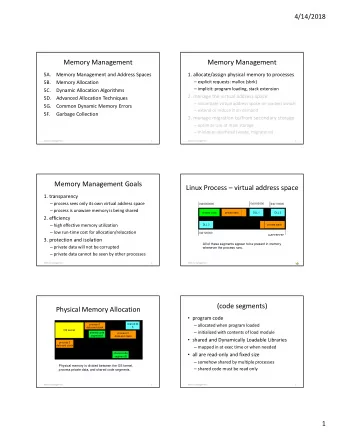

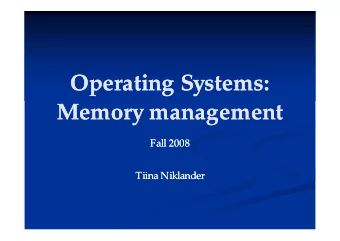
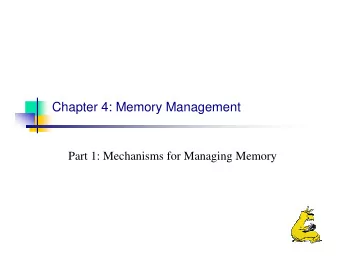

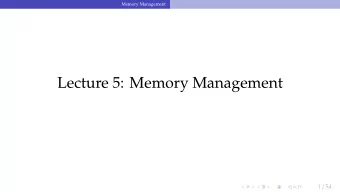

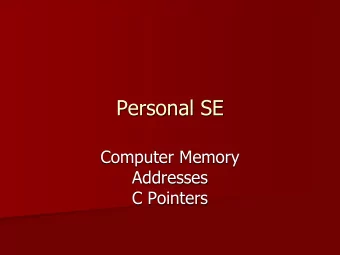
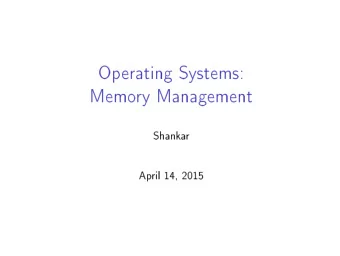
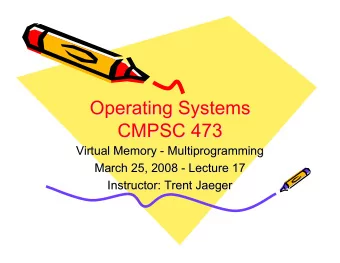

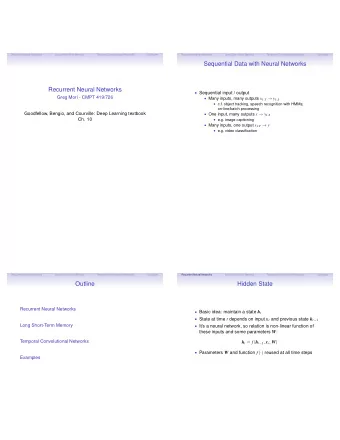
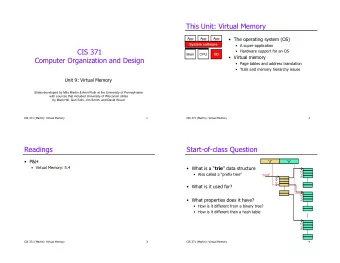
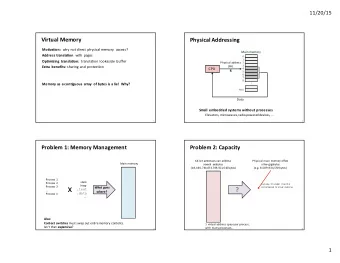
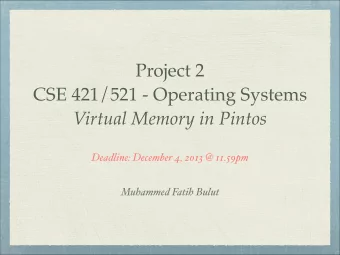

 Sambuz
Sambuz